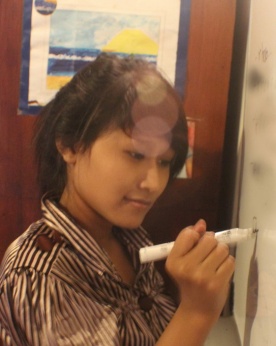Why ‘Bahasa Indonesia’ should normally be translated as ‘Indonesian’ November 21, 2012
Posted by Sharehouse Jakarta in Uncategorized.Tags: indonesian translation, language of Indonesia
6 comments
Once upon a time there was a video of Barack Obama speaking Indonesian at a press event. This was right after he became president, and before he had delivered any impressive speeches in “Bahasa,” here in Indonesia. So people were talking about how awesome his Indonesian was, after all those years.
And then Indonesia-linked journo-linguist Ben Zimmer posted the video on a University of Pennsylvania linguistics Penn LDC Language Log and tagged it up as #bilingualism #LanguageAndPolitics #multilingualism #pragmatics.
The original post included this note:
One pet peeve: the ABC News report refers to Obama’s proficiency in “Bahasa Indonesian.” The language is called Indonesian in English and Bahasa Indonesia in Indonesian. “Bahasa Indonesian” is a mix-up of the two terms. This confusion could be avoided by simply referring to the language, in English, as Indonesian, but the imprecise use of the term Bahasa on its own (which simply means “language”) by expats and journalists has apparently led to further misunderstanding about the name of the language.
After all, no one says “I had fun practicing my Français in Paris last week” — unless they’re playing. So is top 15 global language Bahasa Indonesia — Benedict Anderson’s “Revolutionary Malay” — somehow different? After all, until very recently, no one at all spoke Indonesian as a first language, and there was no such thing as Indonesian literature.
No. It’s not different. Thus, may safely conclude that the best reason for saying, “Last month I was in Jogjakarta practicing my Bahasa Indonesia” is that you didn’t get enough practice while you were there.
Just in case, I’ve thought up a few reasons why it makes perfect sense — to me — not to say Bahasa Indonesia when I’m speaking English.
Reasons why:
1) If we continue to translate Bahasa Indonesia into English as Bahasa Indonesia, then people will continue trying to shrink that down to “Bahasa.” And then we’re just one step away from absurdities like “Bahasa Indonesian.”
2) “Bahasa” isn’t a good abbreviation for Bahasa Indonesia in Indonesian or English. Odd conventions do arise over the water cooler or in the field — those situations when you’re speaking half this, half that, and all you really care about is not looking dumb or offending the other guy. But that doesn’t make “Bahasa” [language] the official language of Indonesia.
3) Indonesian is one word, not two. Bahasa Indonesia is twice as long but much more ambiguous. This matters, as computers aren’t real flexible thinkers and software localization teams don’t have a whole lot of time on their hands to ponder socio-lingustics and the role of national languages in the construction of the imagined community.
4) Indonesia is so chock full of mystery and wonder, there’s hardly any need to mystify the name of the national language.
In some contexts (e.g., law and science), “Indonesian” may actually be imprecise — whenever it’s unclear whether the reference is to the people, the place — or what. After all, this isn’t an ancient language that everyone has definitely-and-for-sure heard of (like Malay).
But, nope. Indonesian is a joy. It’s easy to speak (phonetic alphabet, no tones, little grammar misery); it’s easy to write (no characters); and it even has an easy name: Indonesian.
5) What’s wrong with the -ian suffix? We’ve got Russ-ian, Egypt-ian, Hungar-ian and tons of others … so why not Indones-ian?
6) While editing, I often find the lovely qualifier, Indonesian, very much neglected by my Indonesian editees (because of second language interference, or whatever you might call it). That is, they almost always opt for “Indonesia’s culture” and “Indonesia’s market” over “Indonesian culture” and “the Indonesian market.”
Admittedly, “Indonesia’s language” isn’t going to work as a way of bringing Bahasa Indonesia into English. But what’s wrong with this little conversion process here: Bahasa Indonesia >> the Indonesian language >> Indonesian.
7) No idea who is behind this Bahasa Indonesia ≠ Indonesian myth. Apparently it’s a cross-cultural conspiracy comprising native and non-native speakers of Indonesian.
One thing I do often hear Indonesian translators say is, “You can’t translate proper nouns like Universitas Indonesia or Bahasa Indonesia.” While this appears to be a non-rule, it must have a basis in something.
Still, native English speakers are arguably the ones most at fault for not being able to work out that, in English, the word for Bahasa Indonesia is Indonesian.
+++++++++++++++
NOTE: The approach above is supposedly a practical one — that may benefit translators, computer programmers and geography students (#pragmatics). But will be other approaches and other considerations (#LanguageAndPolitics).
The ideas of Benedict Anderson are surely on point here. The author of Imagined Communities coined the memorable term Revolutionary Malay to help explain how a non-language becomes one of the world’s most widely spoken languages in two generations.
Anderson knew Indonesian as well as anyone. He died last year, aged 80, on a lecture circuit in Indonesia .
Outsource my education and future to a foreign agent (agen universitas luar negeri) — yes, no, maybe? November 13, 2012
Posted by Sharehouse Jakarta in Uncategorized.Tags: agen beasiswa, agen kuliah, agen sekolah, agen studi, educational consultant, ICEF
add a comment
IDP Education is what we might call an “agen universitas luar negeri” or foreign university agent. It’s also a global education company with over 40 years of experience helping ASEAN connect with rich educational opportunities in Australia, although now IDP has entirely outgrown Oz.
Based on my chat with Ibu Isla lat year, IDP was practically started in Indonesia. The recruiter opened its doors in Jakarta in 1981 and now has 13 offices throughout the archipelago. Unlike most other agents in town, IDP is also certified by the American International Recruitment Council (AIRC), which isn’t easy.
Still, unless you’re dealing with James Bond directly, then before placing your entire future in the hands of a foreign agent, maybe it’s a good idea to find out who they’re really working for!
IDP is owned by several dozen Australian universities and SEEK Ltd, a major player in the Asia Pacific jobs market (80% owner of Jobs.DB website). In addition to distributing Australian edu products in key markets like India and China, they also provide language proficiency (33% owner of IELTS), immigration (Australia visa), research, and other related education services.
The consulting process they follow is clearly broken down into easy steps, which is also the point of the video below — that corporate ed giants like IDP really can streamline the applications and admissions process so it’s almost automatic (just add money ; )
No surprises there, correct? Since the IDP stakeholders collectively hold all the relevant puzzle pieces — and can influence curriculum trends in Oz, recruiting strategies, even immigration rules. Just guessing, but they probably know more about the Indonesian education system than Indonesia.
Still, here are a couple of other things to keep in mind:
- University agents generally represent universities, not students (depends on contract)
- No matter how well an education consultant understand your needs and interests, you prolly understand them a bit better
- The brainstorming and research skills that are required to plan your education and career are part of the education itself and these are precisely the skills Indonesian employers are seeking
The student in the video hints at what a hassle it was to make some of the initial decisions about pursuing an education overseas (before calling IDP). However, that hassle — or struggle — is arguably part of what we refer to as “seeking an education,” at least in the Western academic tradition.
Based on experience, shopping for a degree is real learning. The motivation to shop hard is (or should be) huge. If this is your first degree then, then — sorry– maybe this is also your introduction to the global ed biz. Hopefully we’re not as bad as bankers (all the time =)
EXAMPLE: So Vada likes math, business and computers. She’s been told by a mentor there aren’t many “quants in skirts” out there. So she decides to study advanced IT and finance and become a “quant.” But what’s it called? Mathematical finance? Financial engineering? Computational finance? Well, the answer will vary from one education market and institution to another.
So that’s where the creativity comes in. Meanwhile, comparing the time to complete the degree, cost, location, academic rigor and relative market value — that will require a bit of analysis, right ? And analytical thinking is a crucial S1 and s2 job search competency.
So my point is, don’t reject “real” learning because you want to focus on “book” learning. Even a difficult choice like IELTS v. TOEFL or GMAT v. GRE might be an opportunity to become better acquainted with nuances within your own skill set and goal set.
Another detail about IDP — so far they only have a handful of clients in the US and UK, although a few months ago they inked an important deal with State University of New York (SUNY) which has over 60 campuses, including one in South Korea.


